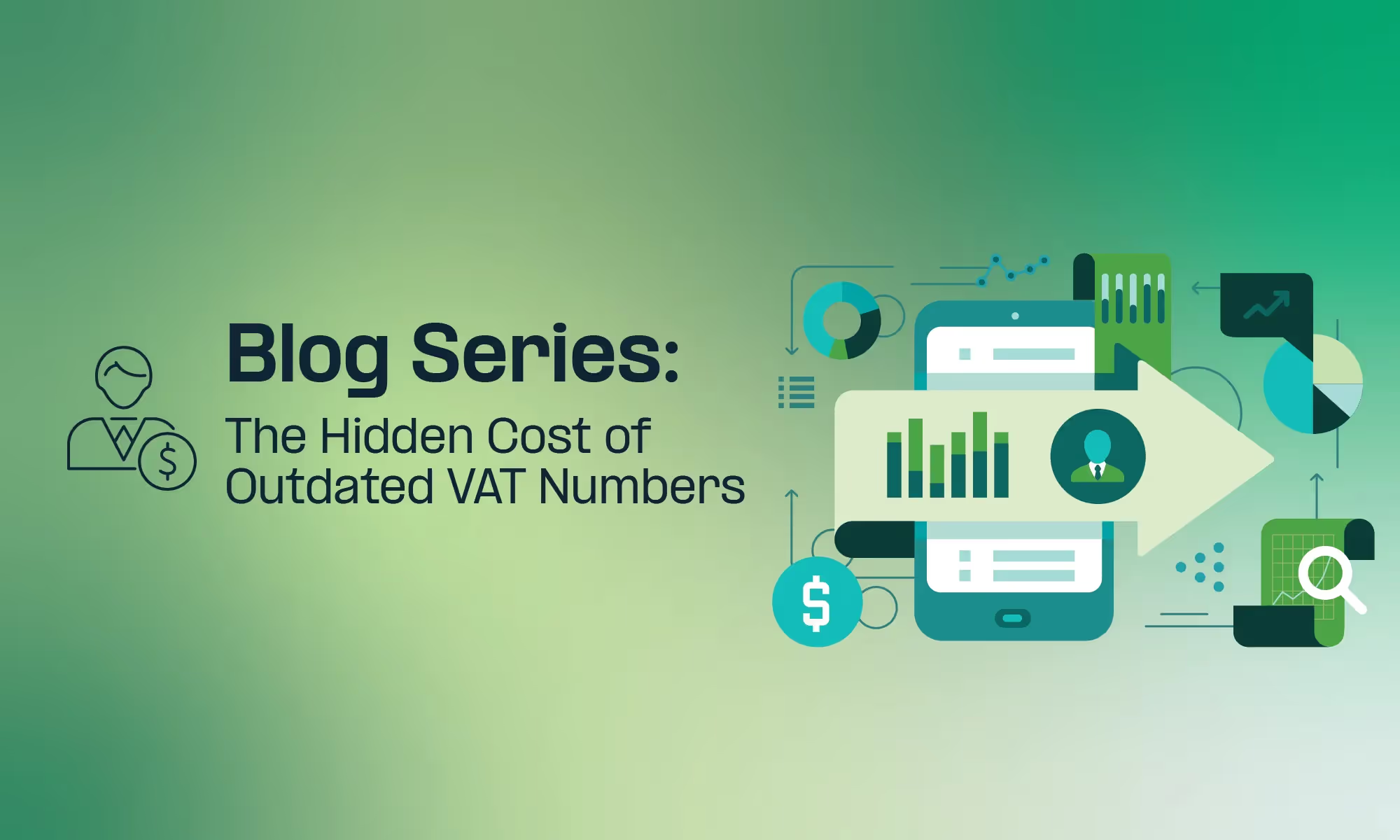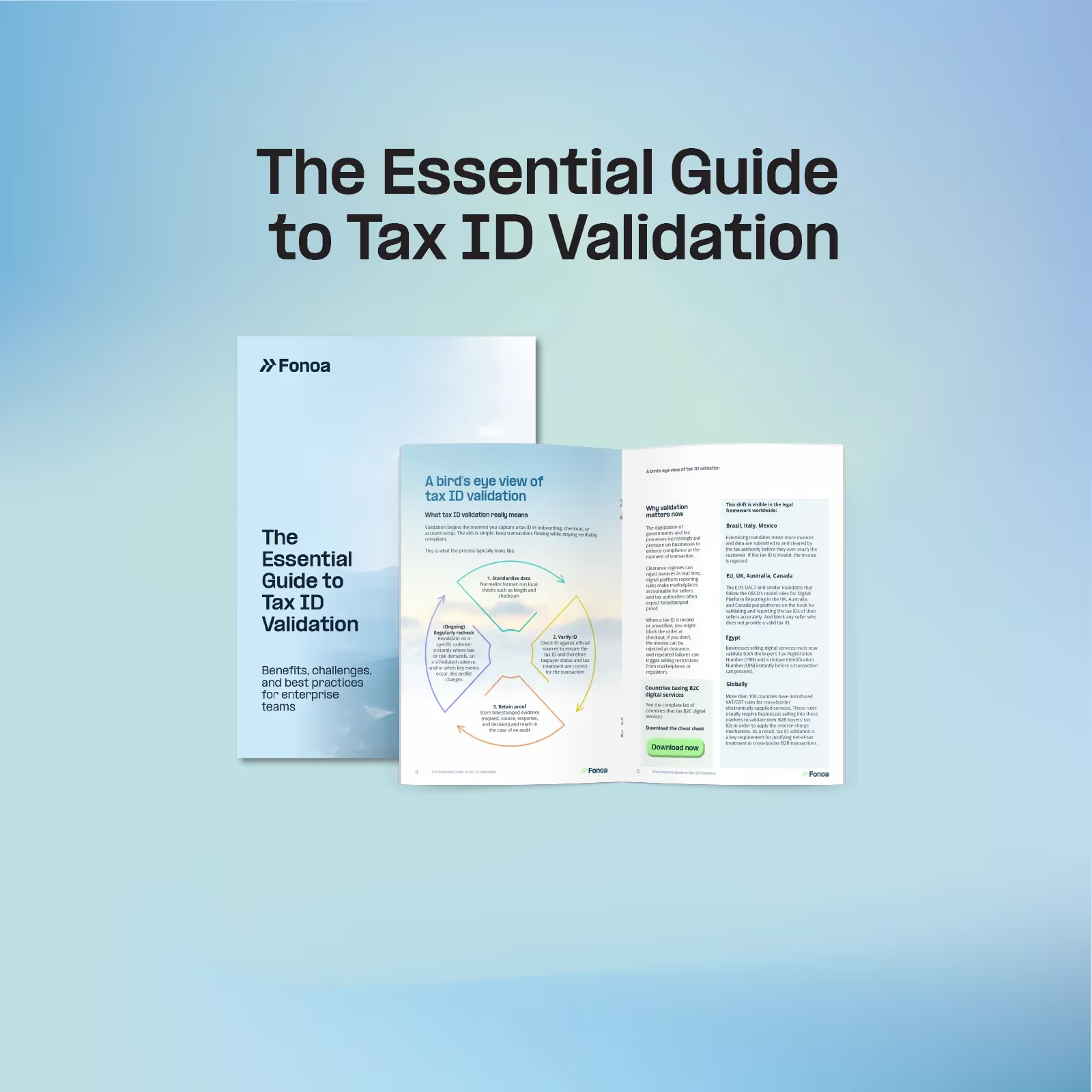Businesses selling into Egypt will be required to validate their B2B buyers' Tax Registration Number (TRN) alongside a new identifier, the Unique Identification Number (UIN). This requirement is essential to justify zero-rating transactions under the reverse charge VAT mechanism, aiming to tighten VAT compliance.
Particularly, this upcoming update impacts multinational companies offering digital and remote services, including software licenses, streaming subscriptions, and digital advertising. To align with these new Egyptian VAT regulations, these companies must incorporate automatic tax ID validation mechanisms into their operations.
Furthermore, to access the new tax ID validation service, affected companies are required to register with the Egyptian Tax Authority. As per VAT Law No. 3 of 2022 and Minister of Finance Decree No. 160 of 2023, a simplified tax registration is now required for Non-Residents Vendors providing digital or remote services in Egypt. This step is crucial for maintaining seamless business operations and ensuring compliance with the updated tax laws.
Additionally, Egyptian businesses looking to procure digital services from international sources will need to secure a UIN. This secret identifier enhances the reliability of tax ID validations, offering a higher level of confidence in the compliance process.
For assistance in navigating these changes and ensuring your business remains compliant, reach out to Fonoa today. Our expertise can help simplify the transition to these new requirements, allowing you to focus on your core business activities.
Timeline
The new tax ID validation method, including the validation of the UIN, is enforced starting 1 November 2024.
Egyptian businesses can start applying for UINs from 1 October 2024.
Details
In an effort to combat tax evasion and enhance VAT compliance, the Egyptian Tax Authority (ETA) is taking a significant step forward by introducing a new, secret identifier known as the Unique Identification Number (UIN). This move comes in response to the widespread public availability of Tax Registration Numbers (TRN) in Egypt, which has led to instances where individuals falsely claim to be B2B buyers by using publicly available TRNs to avoid paying Egyptian VAT. The introduction of the UIN, coupled with a real-time automated validation method, aims to ensure that only actual business owners are privy to this information, thereby increasing VAT revenue and tightening the noose on fraudulent tax practices.
TRN and UIN Validation
At the core of Egypt's new VAT rules is the requirement for businesses selling into Egypt, across borders, to validate the tax ID (Tax Registration Number or TRN) of their B2B buyers. This validation process is crucial for justifying zero-rating transactions under the reverse charge VAT mechanism. However, the introduction of an entirely new identifier, the Unique Identification Number (UIN), alongside the TRN, marks a significant shift in how tax ID validations will be conducted moving forward.
The UIN, a 39-character mixed format identifier, adds an extra layer of security and confidence in tax ID validations, ensuring a more reliable verification process. This new identifier is not just a random string of characters but a carefully structured code that will be essential for B2B transactions, especially for purchasing digital services from abroad.
API Integration for Real-Time TRN and UIN Verification
To facilitate the validation of TRNs and UINs, businesses will need to integrate their systems with the Egyptian Tax Authority's (ETA) API system. This integration allows for the automated exchange of information between the non-resident vendor and ETA, enabling real-time verification of the TRN and UIN of the legal business buyer.
The process involves developing an interface capable of communicating with ETA's API system, which requires significant programming and technical resources. Once in place, this system can automatically check the validity of the TRN and UIN before completing a sale, with the API returning information on the validity of these identifiers.
Registration and Compliance Timeline
Affected companies must register at the Egyptian Tax Authority to acquire access credentials for the new tax ID validation service, with the application process for client ID and secret to use the API commencing on October 1st. This process can be initiated ont the Egyptian Tax Authority’s website according to a recent news alert published by the E-Commerce Tax Unit.
Moreover, the UIN generation system/process will be finalized by the same date, with the UINs set to be valid for one year.
Starting from November 1, 2024, UINs will be mandatory for B2B transactions to validate the non-charging of VAT from non-resident platforms according to the Reverse Charge Scheme. This timeline gives businesses a clear window to adapt their systems and processes to comply with the new regulations.
How Fonoa Can Help
Navigating these new VAT rules in Egypt can be daunting for multinational businesses, especially those with extensive digital service offerings. Fonoa offers tailored solutions to simplify tax compliance, including assistance with the integration of your systems with the Egyptian Tax Authority's API for real-time TRN and UIN verification. By partnering with Fonoa, businesses can ensure they remain compliant with the latest VAT regulations in Egypt, avoiding potential penalties and disruptions to their operations.
In conclusion, Egypt's new VAT rules signify a move towards more sophisticated tax compliance mechanisms, emphasizing the importance of technological integration for multinational businesses. By understanding these changes and taking proactive steps to comply, businesses can continue to thrive in the Egyptian market while adhering to the latest tax regulations.
Additional Resources:
Egypt Publishes VAT Guidelines for Digital and Other Remote Services























